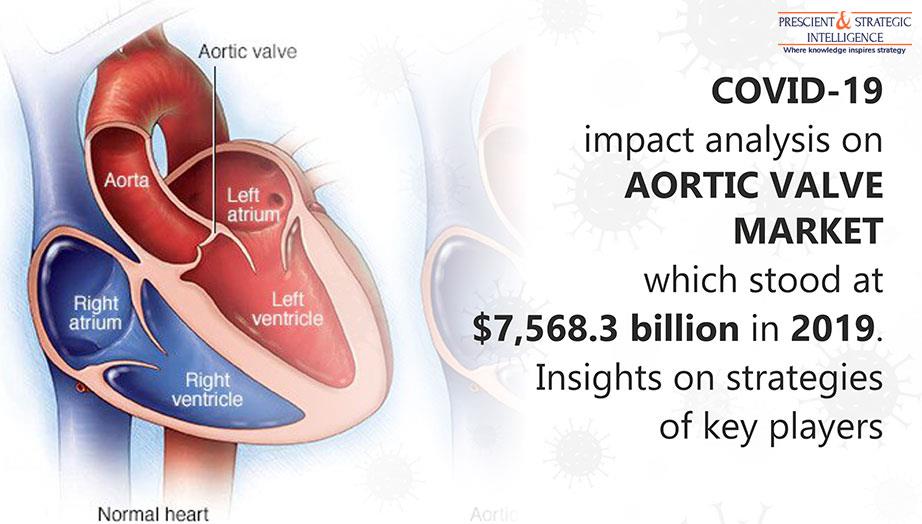
403
Sorry!!
Error! We're sorry, but the page you were looking for doesn't exist.
Biological Aortic Valves Conducive for Elderly
(MENAFN- P&S Intelligence) Factors such as increasing prevalence of valvular diseases and rising number of initiatives for imparting awareness regarding valve replacement are expected to supplement the aortic valve market growth at a CAGR of 13.2% during the forecast period (2020–2030). At this rate, the market’s value will increase from $7,568.3 billion in 2019 to $29,146.9 million by 2030.
Aortic regurgitation and aortic stenosis are the most common valvular diseases. Rheumatic heart disease (RHD) is the most common cause of aortic regurgitation. According to the World Health Organization (WHO), nearly 33 million people around the globe are affected by RHD that accounts for around 2% of the population suffering from cardiovascular diseases (CVDs). These conditions mostly affect the old people. Thus, booming geriatric population will fuel the consumption of aortic valves in the coming years, which, in turn, will drive the market growth.
Another key factor driving the aortic valve market is the growing support from governments, worldwide. Government organizations are taking multiple initiatives to impart knowledge regarding aortic valve replacement procedures. For instance, the European Association of Percutaneous Cardiovascular Interventions (EAPCI) launched Valve for Life initiative in Europe, in 2015. It aims to improve the access to transcatheter valve procedures, enhance the educational standards for healthcare professionals, raise awareness regarding valvular diseases, decrease obstacles for therapy implementation, and end age and gender discrimination in access to medical care, in the region.
Aortic valves are available as mechanical and tissue/biological valves. With constant developments in technology and rapid demand for valves from the ageing population, medical professionals are primarily opting for biological or tissue aortic valves. These valves are implanted in the human body either through open surgery or minimally invasive surgery (MIS). The surgeons are preferring MIS implantation procedure, as it causes lesser trauma to the patients and stimulates the recovery process, in comparison to open-heart surgeries.
Aortic regurgitation and aortic stenosis are the most common valvular diseases. Rheumatic heart disease (RHD) is the most common cause of aortic regurgitation. According to the World Health Organization (WHO), nearly 33 million people around the globe are affected by RHD that accounts for around 2% of the population suffering from cardiovascular diseases (CVDs). These conditions mostly affect the old people. Thus, booming geriatric population will fuel the consumption of aortic valves in the coming years, which, in turn, will drive the market growth.
Another key factor driving the aortic valve market is the growing support from governments, worldwide. Government organizations are taking multiple initiatives to impart knowledge regarding aortic valve replacement procedures. For instance, the European Association of Percutaneous Cardiovascular Interventions (EAPCI) launched Valve for Life initiative in Europe, in 2015. It aims to improve the access to transcatheter valve procedures, enhance the educational standards for healthcare professionals, raise awareness regarding valvular diseases, decrease obstacles for therapy implementation, and end age and gender discrimination in access to medical care, in the region.
Aortic valves are available as mechanical and tissue/biological valves. With constant developments in technology and rapid demand for valves from the ageing population, medical professionals are primarily opting for biological or tissue aortic valves. These valves are implanted in the human body either through open surgery or minimally invasive surgery (MIS). The surgeons are preferring MIS implantation procedure, as it causes lesser trauma to the patients and stimulates the recovery process, in comparison to open-heart surgeries.

Legal Disclaimer:
MENAFN provides the
information “as is” without warranty of any kind. We do not accept
any responsibility or liability for the accuracy, content, images,
videos, licenses, completeness, legality, or reliability of the information
contained in this article. If you have any complaints or copyright
issues related to this article, kindly contact the provider above.


















Comments
No comment